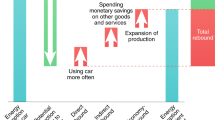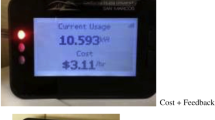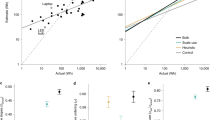Abstract
Mental accounting refers to the fact that people create mental budgets to organize their resource use and to create linkages between specific acts of consumption and specific payments. Research on financial decision-making and consumer behaviour shows that these mechanisms can have a large impact on decisions and behaviours, deviating from normative economic principles. Here we introduce a theoretical framework illustrating how mental accounting mechanisms may influence individual decisions and behaviours driving energy consumption and carbon emissions. We demonstrate the practical relevance of mental accounting in the context of designing carbon pricing mechanisms and discuss the ethical dimensions of applying the concept to intervention design. By bridging the mental accounting literature and research in the energy domain, we aim to stimulate the study of the cognitive mechanisms underlying energy-relevant decisions and the development of novel theory-based interventions targeting reductions of energy use and carbon emissions.
This is a preview of subscription content, access via your institution
Access options
Access Nature and 54 other Nature Portfolio journals
Get Nature+, our best-value online-access subscription
$29.99 / 30 days
cancel any time
Subscribe to this journal
Receive 12 digital issues and online access to articles
$119.00 per year
only $9.92 per issue
Buy this article
- Purchase on Springer Link
- Instant access to full article PDF
Prices may be subject to local taxes which are calculated during checkout



Similar content being viewed by others
References
Thaler, R. H. Mental accounting and consumer choice. Mark. Sci. 4, 199–214 (1985).
Thaler, R. H. Mental accounting matters. J. Behav. Decis. Mak. 12, 183–206 (1999).
Tversky, A. & Kahneman, D. The framing of decisions and the psychology of choice. Science 211, 453–458 (1981).
Antonides, G. & Ranyard, R. in Economic Psychology (ed. Ranyard, R.) 123–138 (John Wiley & Sons, 2018).
Antonides, G., Manon de Groot, I. & Fred van Raaij, W. Mental budgeting and the management of household finance. J. Econ. Psychol. 32, 546–555 (2011).
Heath, C. & Soll, J. B. Mental budgeting and consumer decisions. J. Consum. Res. 23, 40–52 (1996).
Thaler, R. H. Anomalies: saving, fungibility, and mental accounts. J. Econ. Perspect. 4, 193–205 (1990).
Tessari, T. et al. €1 ≠ €1: coins versus banknotes and people’s spending behavior. Eur. Psychol. 16, 238–246 (2011).
Thaler, R. H. & Johnson, E. J. Gambling with the house money and trying to break even: the effects of prior outcomes on risky choice. Manage. Sci. 36, 643–660 (1990).
Muehlbacher, S., Hartl, B. & Kirchler, E. Mental accounting and tax compliance. Public Financ. Rev. 45, 118–139 (2017).
Liebe, U., Gewinner, J. & Diekmann, A. What is missing in research on non-monetary incentives in the household energy sector? Energy Policy 123, 180–183 (2018).
Seebauer, S. The psychology of rebound effects: explaining energy efficiency rebound behaviours with electric vehicles and building insulation in Austria. Energy Res. Soc. Sci. 46, 311–320 (2018).
Parag, Y., Capstick, S. & Pootinga, W. Policy attribute framing: a comparison between three policy instruments for personal emissions reduction. J. Policy Anal. Manag. 30, 889–905 (2011).
Capstick, S. B. & Lewis, A. Effects of personal carbon allowances on decisionmaking: evidence from an experimental simulation. Clim. Policy 10, 369–384 (2010).
Hastings, J. S. & Shapiro, J. M. Fungibility and consumer choice: evidence from commodity price shocks. Q. J. Econ. 128, 1449–1498 (2013).
Piana, V. Consumer theory: the neoclassical model and its opposite evolutionary alternative. J. Econ. Issues 31, 651–664 (2003).
Rajagopal, P. & Rha, J. Y. The mental accounting of time. J. Econ. Psychol. 30, 772–781 (2009).
Chatelain, G. et al. Feel good, stay green: positive affect promotes pro-environmental behaviors and mitigates compensatory “mental bookkeeping” effects. J. Environ. Psychol. 56, 3–11 (2018).
Clot, S., Andriamahefazafy, F., Grolleau, G., Ibanez, L. & Méral, P. Compensation and Rewards for Environmental Services (CRES) and efficient design of contracts in developing countries. Behavioral insights from a natural field experiment. Ecol. Econ. 113, 85–96 (2015).
Godek, J. & Murray, K. B. Effects of spikes in the price of gasoline on behavioral intentions: a mental accounting explanation. J. Behav. Decis. Mak. 25, 295–302 (2012).
Kahneman, D. & Tversky, A. in Handbook of the Fundamentals of Financial Decision Making (eds MacLean, L. C. & Ziemba, W. T.) 269–278 (World Scientific, 2013).
Nilsson, A., Bergquist, M. & Schultz, W. P. Spillover effects in environmental behaviors, across time and context: a review and research agenda. Environ. Educ. Res. 23, 573–589 (2017).
Marghetis, T., Attari, S. Z. & Landy, D. Simple interventions can correct misperceptions of home energy use. Nat. Energy 4, 874–881 (2019).
Camilleri, A. R., Larrick, R. P., Hossain, S. & Patino-Echeverri, D. Consumers underestimate the emissions associated with food but are aided by labels. Nat. Clim. Change 9, 53–58 (2019).
Krishnamurthy, P. & Prokopec, S. Resisting that triple-chocolate cake: mental budgets and self-control. J. Consum. Res. 37, 68–79 (2009).
Homburg, C., Koschate, N. & Totzek, D. How price increases affect future purchases: the role of mental budgeting, income, and framing. Psychol. Mark. 27, 36–53 (2010).
Allcott, H. & Rogers, T. The short-run and long-run effects of behavioral interventions: experimental evidence from energy conservation. Am. Econ. Rev. 104, 3003–3037 (2014).
Attari, S. Z., DeKay, M. L., Davidson, C. I. & Bruine de Bruin, W. Public perceptions of energy consumption and savings. Proc. Natl Acad. Sci. USA 107, 16054–16059 (2010).
Tiefenbeck, V., Wörner, A., Schöb, S., Fleisch, E. & Staake, T. Real-time feedback promotes energy conservation in the absence of volunteer selection bias and monetary incentives. Nat. Energy 4, 35–41 (2019).
Santarius, T. & Soland, M. How technological efficiency improvements change consumer preferences: towards a psychological theory of rebound effects. Ecol. Econ. 146, 414–424 (2018).
Klöckner, C. A., Nayum, A. & Mehmetoglu, M. Positive and negative spillover effects from electric car purchase to car use. Transp. Res. Part D 21, 32–38 (2013).
Mullen, E. & Monin, B. Consistency versus licensing effects of past moral behavior. Annu. Rev. Psychol. 67, 363–385 (2016).
Merritt, A. C., Effron, D. A. & Monin, B. Moral self-licensing: when being good frees us to be bad. Soc. Personal. Psychol. Compass 4, 344–357 (2010).
Zelizer, V. A. The social meaning of money: “Special monies”. Am. J. Sociol. 95, 342–377 (1989).
McGraw, A. P., Tetlock, P. E. & Kristel, O. V. The limits of fungibility: relational schemata and the value of things. J. Consum. Res. 30, 219–229 (2003).
Helion, C. & Gilovich, T. Gift cards and mental accounting: green-lighting hedonic spending. J. Behav. Decis. Mak. 27, 386–393 (2014).
Muehlbacher, S. & Kirchler, E. Individual differences in mental accounting. Front. Psychol. 10, 2866 (2019).
Beatty, T. K. M., Blow, L., Crossley, T. F. & O’Dea, C. Cash by any other name? Evidence on labeling from the UK Winter Fuel Payment. J. Public Econ. 118, 86–96 (2014).
Lange, I., Moro, M. & Rahman, M. M. Cleaner nudges? Policy labels and investment decision-making. Energy J. 39, 27–51 (2015).
Abeler, J. & Marklein, F. Fungibility, labels, and consumption. J. Eur. Econ. Assoc. 15, 99–127 (2017).
Olsen, J., Kasper, M., Kogler, C., Muehlbacher, S. & Kirchler, E. Mental accounting of income tax and value added tax among self-employed business owners. J. Econ. Psychol. 70, 125–139 (2019).
Fell, M. J. et al. Validity of energy social research during and after COVID-19: challenges, considerations, and responses. Energy Res. Soc. Sci. 68, 101646 (2020).
Grimm, L. R. Psychology of knowledge representation. Wiley Interdiscip. Rev. Cogn. Sci. 5, 261–270 (2014).
Dütschke, E., Frondel, M., Schleich, J. & Vance, C. Moral licensing—another source of rebound?. Front. Energy Res. 6, 38 (2018).
Allcott, H. Consumers’ perceptions and misperceptions of energy costs. Am. Econ. Rev. 101, 98–104 (2011).
Stern, P. C. A reexamination on how behavioral interventions can promote household action to limit climate change. Nat. Commun. 11, 918 (2018).
Andor, M. A., Gerster, A., Gillingham, K. T. & Horvath, M. Running a car costs much more than people think — stalling the uptake of green travel. Nature 580, 453–455 (2020).
Funder, D. C. & Ozer, D. J. Evaluating effect size in psychological research: sense and nonsense. Adv. Methods Pract. Psychol. Sci. 2, 156–168 (2019).
Baranzini, A. et al. Carbon pricing in climate policy: seven reasons, complementary instruments, and political economy considerations. Wiley Interdiscip. Rev. Clim. Chang. 8, e462 (2017).
High-Level Commission on Carbon Prices Report of the High-Level Commission on Carbon Prices (World Bank, 2017).
Carattini, S., Levin, S. & Tavoni, A. Cooperation in the climate commons. Rev. Environ. Econ. Policy 13, 227–247 (2019).
Nudges for nudgers. Nat. Energy 3, 701 (2018).
Mertens, S., Hahnel, U. J. J. & Brosch, T. This way, please: uncovering the directional effects of attribute translations on decision making. Judgm. Decis. Mak. 15, 25–46 (2020).
Ungemach, C., Camilleri, A. R., Johnson, E. J., Larrick, R. P. & Weber, E. U. Translated attributes as choice architecture: aligning objectives and choices through decision signposts. Manage. Sci. 64, 2445–2459 (2018).
Antweiler, W. & Gulati, S. Frugal cars or frugal drivers? How carbon and fuel taxes influence the choice and use of cars. SSRN https://doi.org/10.2139/ssrn.2778868 (2016).
State and Trends of Carbon Pricing 2020 (World Bank, 2020).
Carattini, S., Kallbekken, S. & Orlov, A. How to win public support for a global carbon tax. Nature 565, 289–291 (2019).
Carattini, S., Carvalho, M. & Fankhauser, S. Overcoming public resistance to carbon taxes. Wiley Interdiscip. Rev. Clim. Chang. 9, e531 (2018).
Baranzini, A. & Carattini, S. Effectiveness, earmarking and labeling: testing the acceptability of carbon taxes with survey data. Environ. Econ. Policy Stud. 19, 197–227 (2017).
Li, S., Linn, J. & Muehlegger, E. Gasoline taxes and consumer behavior. Am. Econ. J. Econ. Policy 6, 302–342 (2014).
Chetty, R., Looney, A. & Kroft, K. Salience and taxation: theory and evidence. Am. Econ. Rev. 99, 1145–1177 (2009).
Cohen, M. A. & Viscusi, W. K. The role of information disclosure in climate mitigation policy. Clim. Chang. Econ. 3, 1–21 (2012).
Acknowledgements
This research was supported by Swiss National Science Foundation Grant PYAPP1\_160571 and Swiss Federal Office of Energy Grant SI/501108-01. The funding source had no involvement in the preparation of the Perspective. The research is part of the activities of SCCER CREST, which is financially supported by the Swiss Innovation Agency – Innosuisse.
Author information
Authors and Affiliations
Contributions
U.J.J.H., G.C. and T.B. planned and conceptualized the research; B.C. and V.P. provided scientific and practical input; U.J.J.H. wrote the original draft; T.B. contributed to subsequent drafts; all authors reviewed and edited the manuscript, including the final version; T.B. acquired funding for the research.
Corresponding authors
Ethics declarations
Competing interests
The authors declare no competing interests.
Additional information
Publisher’s note Springer Nature remains neutral with regard to jurisdictional claims in published maps and institutional affiliations.
Rights and permissions
About this article
Cite this article
Hahnel, U.J.J., Chatelain, G., Conte, B. et al. Mental accounting mechanisms in energy decision-making and behaviour. Nat Energy 5, 952–958 (2020). https://doi.org/10.1038/s41560-020-00704-6
Received:
Accepted:
Published:
Issue Date:
DOI: https://doi.org/10.1038/s41560-020-00704-6
This article is cited by
-
Consumer awareness of load shapes
Nature Energy (2022)
-
Energy-related behaviour and rebound when rationality, self-interest and willpower are limited
Nature Energy (2021)
-
Integration of prosumer peer-to-peer trading decisions into energy community modelling
Nature Energy (2021)



